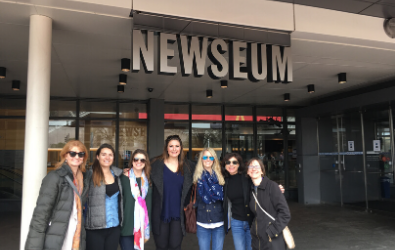Today is a difficult day for fans of free speech and the First Amendment.
After 11 years, on December 31, the Newseum in Washington D.C. is closing its doors. Although the museum drew an estimated 850,000 visitors per year, the numbers weren’t enough to keep the institution financially sound. It didn’t help that the Newseum charged for admission, while the vast majority of D.C. museums are free.
The closing of the museum comes at a tough time for journalism. According to the Committee to Protect Journalists as of December 1, in 2019 an estimated 250 journalists around the world were jailed for doing their jobs. More than 2,000 newspapers have closed over the past 15 years. Many of those which remain, especially at the local level, are being gobbled up by giant media companies that are slashing staff to save costs.
Just over two years ago, Teak Media + Communication visited the Newseum to celebrate our company’s 20thanniversary. We marveled at the communication artifacts, including graffiti on giant chunks of the Berlin Wall, an outdated live truck and news helicopter, and a piece of a World Trade Center antenna that somehow survived the fall of the towers on September 11, 2001. We were sobered by the many reminders a free press shouldn’t be taken for granted, including the names of hundreds of journalists who died while doing their jobs etched on glass panels stretching two stories high.
As some 300,000 artifacts go into storage at an undisclosed location awaiting a new permutation of the museum, the lessons of the institution should be ingrained in all of our hearts and heads. The First Amendment is something that should be known, revered and respected. People need to pull out their wallets and support their local newspapers and cherished national outlets by buying subscriptions, instead of relying on articles that can be found for free on the internet.
As the distance and time between information and the audience has shrunk, the need to be critical consumers of the news is increasingly important. Having a seemingly infinite number of news sources to choose from has led many to live in political silos where they only listen to outlets featuring people who share their views – the news echo chamber. The inclusion of phrases like “fake news” and “alternative facts” as part of the vernacular has led to real news being labeled as false, and inaccurate reports being labeled as news, requiring even more attention from the audience to parse each word and phrase to differentiate between fact and fiction.
Perhaps the most hopeful display at the Newseum was the long case lining the front of the building containing that day’s front pages from newspapers from all 50 states. There was a similar display inside the museum showing front pages from international papers. According to Poynter, even after the closing of the museum, Today’s Front Pages will remain active on both the Newseum’s website and app. They serve as an important and constant reminder that with each sunrise, journalists have new pages to fill, new rundowns to stack, new stories to tell, and a new chance to get it right.


